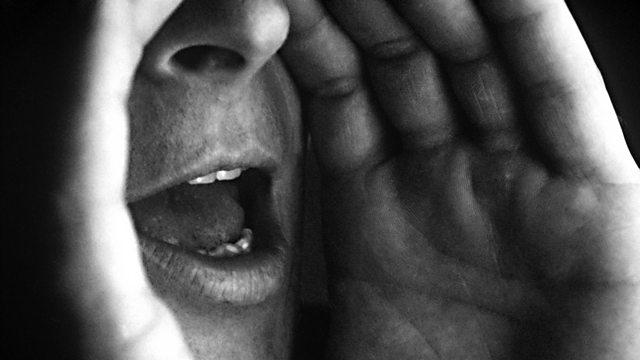
Conversations
Texts and music centring on conversations, with readers Catherine Harvey and Jamie Parker. With Socrates, Larkin and Cecil Day-Lewis, plus music by Messiaen and Telemann.
Catherine Harvey and Jamie Parker muse on Conversations from the early Socratic dialogues to Larkin's 'Talking in Bed', and Debrett's to Theodore Zeldin. There are also conversation pieces between modern and original poems, as C. Day Lewis replies poetically to Christopher Marlowe's 'The Passionate Shepherd to his Love'. Music includes Messiaen's Antienne de la conversation intérieure and Telemann's chatty Divertimento in E flat major, TWV.50:21.
Elizabeth Arno (producer).
Last on
More episodes
Previous
Next
Music Played
Timings (where shown) are from the start of the programme in hours and minutes
-
![]() 00:00
00:00BERIO
PIERO (Farulli) from DUETTI for 2 violins, Vol.1 No.18
Performer: Carlo Chiarappa & Stefano Montanari (violins).- DENON CO 75448.
- Tr 18.
-
UNKNOWN, translated by BURTON WATSON
I just had to start a conversation, read by Catherine Harvey
D. H. LAWRENCE
Talk, read by Jamie Parker
![]() 00:01
00:01Claude Debussy
Preludes Book 1 No 3 Le Vent dands la plaine
Performer: Jean-Efflam Bavouzet (piano).- CHAN 10421.
- Tr 3.
�ٷ����鷡�հ���
Conversation (extract), read by Catherine Harvey
![]() 00:04
00:04Georg Philipp Telemann
La Conversation à la table. Gavotte, from Divertimento in E flat major, TWV.50:21
Performer: Collegium Musicum 90, Simon Standage (director).- CHAN 0787.
- Tr 29.
LEONARD BACON
Afternoon Tea, read by Jamie Parker
![]() 00:06
00:06Sergey Rachmaninov
Scherzo for orchestra in D minor [1887]
Performer: Radio Filharmonisch Orkest Holland, Edo de Waart (conductor).- EXTON OVCL-00156.
- Tr 3.
E. E. CUMMINGS
logeorge, read by Jamie Parker
![]() 00:11
00:11NANCARROW
Study # 19 (canon 12:15:20), from Studies for player piano, transcribed for piano duo
Performer: Bugallo-Williams Piano Duo (Helena Bugallo & Amy Williams).- WERGO 6670 2.
- Tr 10.
MARY ELIZABETH COLERIDGE
Winged Words, read by Catherine Harvey
![]() 00:13
00:13Igor Stravinsky
Lied ohne Name for two bassoons
Performer: Matthias Bühlmann & Johannes Jöhri (basssoons).- ARTE NOVA 74321 92650 2.
- Tr 11.
MATTHEW GREEN
Sometimes I dress, with women sit, read by Jamie Parker
TOM GUNN
The Conversation of Old Men, read by Catherine Harvey
![]() 00:14
00:14WOLKENSTEIN
Nu rue mit sorgen
Performer: Andreas Scholl (countertenor), Shield of Harmony Ensemble, Crawford Young (director).- HARMONIA MUNDI HMC902051.
- Tr 15.
CARDUCCI, translated by EDWARD HENRY, Bishop of Exeter Bickersteth
Conversation with Trees, read by Catherine Harvey
ELIZABETH BISHOP
Conversation Poem, read by Jamie Parker
![]() 00:20
00:20György Ligeti
Polyphonic Étude
Performer: Frederik Ullén (piano).- BIS CD 983 DIGITAL.
- Tr 16.
THEODORE ZELDIN
How Talk Can Change Our Lives (extract, from Conversation, read by Catherine Harvey
![]() 00:23
00:23Johann Sebastian Bach
Largo ma non tanto, from Concerto for two Violins in D minor, BWV.1043
Performer: Nigel Kennedy & Daniel Stabrawa (violins), Berlin Philharmonic Orchestra.- EMI 5570912.
- Tr 11.
CHRISTOPHER MARLOWE
The Passionate Shepherd to his Love, read by Jamie Parker
C. DAY LEWIS
Song, read by Catherine Harvey
![]() 00:31
00:31Knut Nystedt
Immortal Bach
Performer: Berlin Radio Chorus, Simon Halsey (director).- HARMONIA MUNDI HMC 801873.
- Tr 7.
![]() 00:36
00:36��Ö�ճ�Ö��
Snatches of a Conversation (2001) (extract)
Performer: Marco Blaauw (double-bell trumpet), Omar Ebrahim (speaker), musikFabrik I Ensemble für Neue Musik, Péter Eötvös (conductor).- BMC CD 097.
- Tr 1.
MIHANGEL MORGAN, translated from Welsh by MARTIN DAVIS
Ive got a talking chair, read by Catherine Harvey
PLATO, edited by TREVOR J. SAUNDERS
Ion, extract from Early Socratic Dialogues, read by Catherine Harvey & Jamie Parker
![]() 00:44
00:44Robert de Visée
Courante
Performer: Vincent Dumstre (theorbo).- ALPHA 003.
- Tr 4.
GRAVES
Over the Brazier, read by Jamie Parker
![]() 00:48
00:48David Sylvian
Conversation Ending in Divorce
Performer: David Sylvian (guitars, synthesisers, keyboard programming), John Taylor (piano), Stuart Bruce (computer programming).- VIRGIN VSCD1221.
- Tr 2.
![]() 00:51
00:51Olivier Messiaen
Antienne de la Conversation Intérieure
Performer: Yvonne Loriod (piano), Jeanne Loriod (onde Martenot), Maîtrise et orchestra de chamber de la R. T. F, Marcel Couraud (director).- ERATO ECD 71594.
- Tr 1.
DYLAN THOMAS
The Conversation of Prayers, read by Catherine Harvey
![]() 01:02
01:02Franz Schubert
Fantasy in F minor for piano duet, D.940 / Op.103 (extract)
Performer: Katia and Marielle Labèque (piano four hands).- KML1117.
- Tr 4.
BOCCACCIO, translated by DANTE
Of Three Girls and of Their Talk, from the Sonnets, read by Jamie Parker
JOHN DONNE
Holy Sonnet XIV, read by Jamie Parker
MARK JARMAN
Unholy Sonnet, read by Catherine Harvey
![]() 01:09
01:09Claudio Monteverdi
Pur ti miro (Coronazione di Poppea)
Performer: Danielle de Niese (soprano), Andreas Scholl (countertenor), English Concert, Harry Bicket (conductor).- DECCA 4782260.
- Tr 7.
PHILIP LARKIN
Talking in Bed, read by Catherine Harvey
Producer Note
‘It’s good to talk’ has become a universally recognized slogan of positive thinking. Conversation is our key to reaching out to others, to exchanging ideas and establishing relationships, and ultimately, through agreement and disagreement, to building culturally-defined societies. The way in which we think and function within our societies today has come about largely through a conversational history of what we understand defines us.
Conversation can change the way we each live and this programme muses over how and why we talk to each other. It also asks how and why we should talk to each other. The need to talk is captured at the very beginning of the programme in the unknown words, ‘I just had to start a conversation’, and there is a guide to the art of conversation given in Debrett’s. Talking is a spontaneous communication between two or more people and there are poems in this programme that capture the importance of conversation in many aspects of life. The blithe conversation of youthful girls dreaming of their lovers in Boccaccio’s Of three Girls and of Their Talk, the gloomy gossip of women drinking sweetened tea in Matthew Green’s Sometimes I dress, with women sit, Tom Gunn’s Conversation of Old Men, a group of soldiers conversing about a better tomorrow in Robert Graves’ Over the Brazier, the neighbourly chat between George and Eddy about ‘the boy’ in E. E. Cummings ‘logeorge’, and the pillow talk of Philip Larkin’s lovers in his poem Talking in Bed.
The centre of the programme is the exposition of Ion, one of Plato’s Early Socratic Dialogues. This recorded conversation between Socrates and Ion, on the necessity of rhapsodes, is a crucial text in the literary history of conversations and dialogues. These texts present philosophical ideas in the form of conversation and have influenced subsequent writers across Europe, from Galileo in 17th century Italy to Berkeley in 18th century England. Whilst the oldest known dialogues are the Sicilian mimes, written in rhythmic prose by Sophron of Syracuse around the early 5th century BC, Plato has bequeathed to literature the first philosophic dialogues that expound the main tenets of Platonic philosophy.
This programme also contains philosophical poems that allude to nature. Mary Elizabeth Coleridge’s poem Winged Words likens our ‘winged words’ darting playfully over the depths of silence to swallows darting across a pool, and Giosuè Carducci tackles death in his Conversation with Trees. The contemporary Welsh poet, Mihangel Morgan, eavesdrops on the many languages spoken by furniture, from talking chair to mirror, Dylan Thomas portrays a father and child looking over the dying mother in his introspective poem, The Conversation with Prayers.
Much of the music I have chosen to complement these texts is related either directly or tenuously to conversation. If conversation is defined as a spontaneous communication of ideas between two or more people, then musically, the most obvious parallel to me is the duet, throwing into focus the exchange of ideas between two paired instruments. There are duets throughout the programme, beginning with Berio’s fleeting étude Piero for two violins and including a transcription of one of Nancarrow’s canonic studies for piano duet, Andreas Scholl singing in duet with himself in Wolkenstein’s beguiling morning dialogue Nu rue mit sorgen, Stravinsky’s brief Lied ohne Name for two bassoons that accompanies Matthew Green’s Sometimes I dress, with women sit, and the Labèque sisters playing the whistful final movement of Schubert’s Fantasy in F minor for piano duet underneath Boccaccio’s portrait of the three girls talking by a well of their lovers followed by one of the most beautiful love duets in opera, Pur ti miro from Monteverdi’s L'incoronazione di Poppea.
I have also included some pieces that relate directly to conversations. Telemann’s Divertimento in E flat major, TWV.50:21 makes specific references to the events in a princely day’s hunting, which includes a gavotte movement entitled ‘Conversation à la table’, a courtly discourse between two flutes, two horns and strings. This courtly movement follows neatly from Debrett’s guide to good conversation. Robert de Visée’s Courante for theorbo is a musical example of seventeenth-century ‘conversation’, which comes from the literary example of ‘artes discendi’, or the art of declamation, as in the writings of Théophile de Viau. The aim of both arts – ‘conversation’ in music and ‘artes discendi’ in literature - was to master rhetorical techniques in such a way as to enliven discourse and move the listener. The theorbo became the symbolic instrument of musical ‘conversation’ in late 17th century France.
Back to our own century, the Hungarian composer, Péter Eötvös, has placed short extracts of dialogue over a frenzied accompaniment of double-bell trumpet and ensemble in his piece, Snatches of a Conversation. I have also created an unlikely musical conversation between Messiaen and David Sylvian as Messiaen’s Antienne de la Conversation Intérieure, an antiphon of the international dialogue with the God within us, emerges seamlessly from the synthensized sound-world of David Sylvian’s Conversation ending in Divorce. Additionally, there is also music in the pogramme that simply sounds chatty like Rachmaninov’s Scherzo and Ligeti’s Étude Polyphonique.
I came across a lovely poetry book in making this programme called Conversation Pieces. It is a collection of poems that talk to other poems. I have included four of these wonderful poems in my programme. Christopher Marlowe’s famous poem The Passionate Shepherd to his Love has influenced a number of re-readings like Raleigh’s The Nymph’s Reply to the Shepherd and Ogden Nash’s Love under the Republicans (or Democrat), thus creating an inter-poetic conversation with the original Marlowe. I have chosen C. Day Lewis’s Song, which takes the romantic shine off Marlowe’s original. Similarly, Mark Jarman’s poem, Unholy Sonnet, is a reinterpretation of John Donne’s Holy Sonnet XIV. At the point in the programme when C. Day Lewis’s poem converses with Marlowe, there is a parallel musical conversation around Bach. First comes the glorious slow movement of Bach’s Double Concerto, itself a dialogue between two violins, and then comes Knut Nystedt’s reinterpretation of Bach’s chorale, Komm, süsser Tod, ‘come sweet death’, words which reflect so well the sentiments of C Day Lewis’s invitation to a life of strife and poverty.
Elizabeth Arno (producer)
Broadcast
- Sun 5 Jul 2015 17:30������̳ Radio 3
The hidden history of plant-based diets
Books website
Get closer to books with in-depth articles, quizzes and our picks from radio & TV.
Gallery



